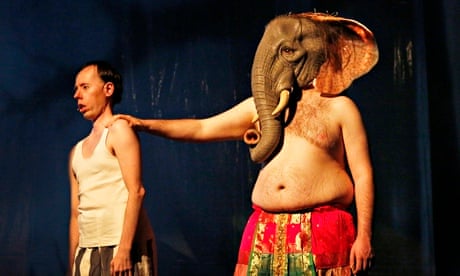Would you buy a ticket to see a production created by a learning disabled theatre company? If you run a theatre or festival do you regularly programme learning disabled work? Anyone who has seen the work of the Australian company Back to Back will know that they don't just produce superb disability-led theatre, they produce superb theatre in every way.
Their show Small Metal Objects would be high on a list of my all-time favourite pieces. The London international festival of theatre and the Edinburgh international festival have both hosted their show Ganesh Versus the Third Reich, a piece that challenges not just the performers but the audience too.
Of course, the fact that they are invited to tour around the world and are paid to do so and that their work gets widespread critical feedback helps validate what they produce, and pushes that work onwards. If you can't get your work seen, and if theatres and venues are reluctant to programme it because they don't think that they will get an audience for it, it's unlikely that the shows produced will develop and grow.
This was one of the issues raised at the Creative Minds conference in Bristol earlier this week which brought together a range of those working in the area. So far in the UK, we do not have a learning disabled company to rival Back to Back or companies, such as the superb Graeae and Deafinitely, created by those with physical disabilities or deaf theatre-makers. Creative Minds is exploring how we develop learning disabled theatre and arts in that direction.
The lack of opportunities for learning disabled people to take part in the creative arts in the UK is a major problem, and one that often gets harder as they get older. Those who do find youth groups and flourish there find it hard to take their work to the next level, and there is a lack of training opportunities. That's where Diverse Futures comes in. It's a website mapping opportunities for disabled young people who want to work in theatre and the other creative arts and showing where the bright spots are in inclusive practice.
But even if you do manage to get training and opportunities, getting programmed might be harder still, although increasingly festivals such as the Southbank's Unlimited offer opportunities, and individuals such as Sarah Gordy help raise the profile of learning-disabled actors.
But an overlooked topic at Tuesday's conference was the issue of quality. As in participatory community work that may bring significant benefits to those taking part but offer less to a paying audience, one of the things that has to be addressed is just how good learning disabled work is, and how it can get better and how it can get programmed and reviewed.
One of the ways that work gets better – in any area of theatre – is through proper evaluation, critical self-awareness and outside input, particularly through longer-term relationships with venues who really value its place in their programmes and who will help enable that. But it's a chicken-and-egg situation. Without a level of consistency and quality, the work won't get programmed and taken seriously, and it won't gain consistency and quality unless it is programmed and talked and written about. It will remain on the margins. It's probably worth remembering that it's taken Graeae many years to break down the barriers, and that may be the case here.
So while it's good to see Creative Minds attempting to raise awareness, the next step must be not just applauding intentions, but making a real attempt to evaluate how such work can benefit the participants, and finding ways it can gain greater prominence.
That demands a robust mix of respect and rigour that doesn't ignore the richness or value of process alone, but which will also help individuals and companies evolve, and which will encourage theatres and venues to develop an audience for this work.

